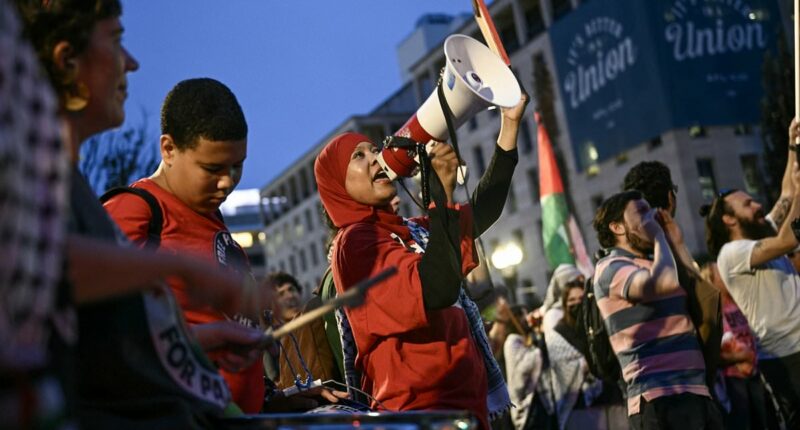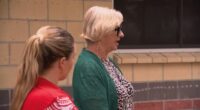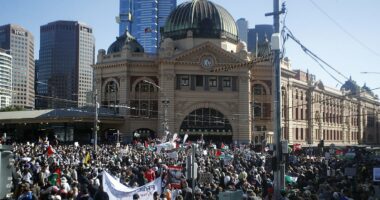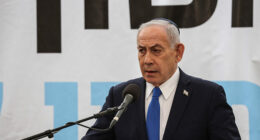Share this @internewscast.com
A federal judge has ruled that Donald Trump’s push to deport students and academics opposed to Israel’s war in Gaza is a deliberate attack on free speech.
US District Judge William Young, a Reagan appointee, said: ‘The effect of these targeted deportation proceedings continues unconstitutionally to chill freedom of speech to this day.’
The scathing 161-page ruling, which the judge described as the most significant of his career, halts an ‘ideological deportation’ campaign which plaintiffs argued was designed to suppress dissent on college campuses.
Young rebuked Trump personally in the fiery ruling, claiming that the president sought only ‘retribution’ with ‘disdain’ for the constitution.
It comes after a wave of anti-Israel protests at universities across the country, rising to a fever pitch over the summer of 2024 at Ivy League institutions including Harvard, UC Berkeley and Columbia.
The Trump administration moved quickly on taking power to deport ringleaders and show that violence on campus would not be tolerated.
Many of the campus protests were riotous and struck fear into Jewish students — some of whom were too afraid to attend classes during the demonstrations.
Writing in his decision, Young said: ‘The President’s palpable misunderstanding that the government simply cannot seek retribution for speech he disdains poses a great threat to Americans’ freedom of speech.’

Protesters shout slogans against the visit to the US of Israel Prime Minister Benjamin Netanyahu at Lafayette Square in Washington, DC, on September 29
The judge added: ‘I fear President Trump believes the American people are so divided that today they will not stand up, fight for, and defend our most precious constitutional values so long as they are lulled into thinking their own personal interests are not affected.’
Lawyers for the Trump administration argued that the deportations were not based on ideology but the necessary enforcement of immigration laws.
During the trial, lawyers for the university associations presented witnesses who testified that the Trump administration had launched a coordinated effort to target students and scholars who had criticized Israel or showed sympathy for Palestinians.
‘Not since the McCarthy era have immigrants been the target of such intense repression for lawful political speech,’ Ramya Krishnan, senior staff attorney at the Knight First Amendment Institute, told the court.
‘The policy creates a cloud of fear over university communities, and it is at war with the First Amendment.’
Trump attorney Victoria Santora told the court: ‘There is no policy to revoke visas on the basis of protected speech.
‘The evidence presented at this trial will show that plaintiffs are challenging nothing more than government enforcement of immigration laws.’
John Armstrong, the senior bureau official in the Bureau of Consular Affairs, testified that visa revocations were based on longstanding immigration law.

Pro-Palestinian demonstrator Mahmoud Khalil, second from left, debates with a pro-Israel demonstrator during a protest at Columbia University, Oct. 12, 2023, in New York
Armstrong acknowledged he played a role in the visa revocation of several high-profile activists, including Rumeysa Ozturk and Mahmoud Khalil, and was shown memos endorsing their removal.
Armstrong also insisted that visa revocations were not based on protected speech and rejected accusations that there was a policy of targeting someone for their ideology.
One witness testified that the campaign targeted more than 5,000 pro-Palestinian protesters.
Out of the 5,000 names reviewed, investigators wrote reports on about 200 who had potentially violated U.S. law, Peter Hatch of ICE’s Homeland Security Investigations Unit testified.
Until this year, Hatch said, he could not recall a student protester being referred for a visa revocation.
Among the report subjects was Palestinian activist and Columbia University graduate Khalil, who was released last month after 104 days in federal immigration detention. Khalil has become a symbol of Trump’s clampdown on the protests.
Another was the Tufts University student Ozturk, who was released in May from six weeks in detention after being arrested on a suburban Boston street.
She said she was illegally detained following an op-ed she co-wrote last year criticizing her school’s response to the war in Gaza.
The judge in the case has previously blocked Trump policies that he disagrees with.
In August, Supreme Court Justices Neil Gorsuch and Brett Kavanaugh attacked Young for blocking the administration’s decision to slash funding for medical research grants dedicated to DEI.
The justices said that because the Supreme Court had already ruled on other grant cases, Young was overstepping his powers.
‘When this Court issues a decision, it constitutes a precedent that commands respect in lower courts,’ Gorsuch wrote.
Young was forced to apologize and said he was unaware that emergency docket rulings were precedent-setting in the lower courts.







